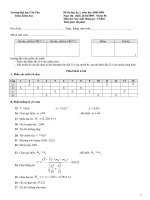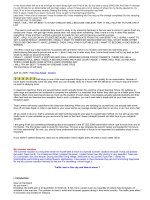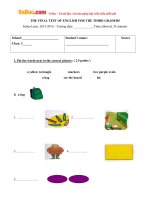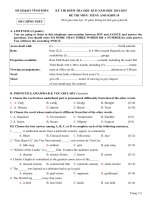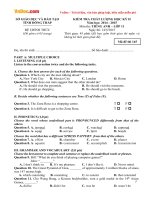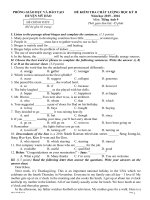Đề thi học kì 2 môn tiếng anh lớp 9 năm 2019 - 2020 trường thcs hồng bàng mã 656 | Tiếng Anh, Lớp 9 - Ôn Luyện
Bạn đang xem bản rút gọn của tài liệu. Xem và tải ngay bản đầy đủ của tài liệu tại đây (101.73 KB, 3 trang )
<span class='text_page_counter'>(1)</span><div class='page_container' data-page=1>
SỞ GD&ĐT HẢI PHÒNG
<b>TRƯỜNG THCS HỒNG BÀNG</b>
<i>(Đề thi có 03 trang)</i>
<b>HỌC KÌ 2</b>
<b>NĂM HỌC 2019 - 2020</b>
<b>MƠN TIẾNG ANH – Khối lớp 9</b>
<i>Thời gian làm bài: 45 phút</i>
<i>(không kể thời gian phát đề)</i>
<b> </b>
Họ và tên học sinh :... Lớp: ...
<b>Mark letter A, B, C or D to indicate the word whose main stress position is placed differently from </b>
<b>that of the others in each group.</b>
<b>Question 1. A. thirteen</b> <b>B. channel</b> <b>C. prefer</b> <b>D. become</b>
<b>Question 2. A. tropical</b> <b>B. disaster</b> <b>C. thunderstorm </b> <b>D. natural </b>
<b>Mark letter A, B, C, or D to indicate the word SIMILAR in meaning to the underlined word.</b>
<b>Question 3. She’ll take the new job whose salary is wonderful.</b>
<b>A. pretty high</b> <b>B. fantastic</b> <b>C. reasonable </b> <b>D. low</b>
<b>Read the following passage and mark the letter A, B, C, or D to indicate the correct word that best </b>
<b>completes each of the numbered blanks from 14 to 16.</b>
<b>DO ALL VOLCANOES ERUPT?</b>
Some volcanoes are always erupting. They are called active volcanoes. Mount Etna in Italy is an active
volcano.
Some volcanoes have not ______(14) ______ since prehistoric times. These are called extinct volcanoes.
Most of the Hawaiian Islands are extinct volcanoes. These volcanoes ___(15) ______have a hot spot under
them. They cannot erupt anymore.
Some volcanoes have not erupted for a long time, so they could erupt again. These are called dormant
volcanoes.
Scientists try to figure out when volcanoes will erupt. Studying volcanoes is hard and dangerous work.
Scientists drill into volcanoes. They create maps of the inside of the volcanoes. They use satellites to study
volcanoes in space. Scientists have been able to predict a few eruptions. _____(16) ______it is not easy to
tell what a volcano might do.
<b>Question 4. A. burnt</b> <b>B. erupted</b> <b>C. been erupted </b> <b>D. been burnt </b>
<b>Question 5. A. no longer </b> <b>B. any longer</b> <b>C. not more </b> <b>D. any more </b>
<b>Question 6. A. Therefore</b> <b>B. And </b> <b>C. During</b> <b>D. But</b>
<b>Mark letter A, B, C, or D to indicate the sentence that is closest in meaning to the given one. </b>
<b>Question 7. “Can you speak English?” my boss asked.</b>
<b>A. My boss asked me if could I speak English.</b>
<b>B. My boss asked me if can I speak English.</b>
<b>C. My boss asked me if I could speak English </b>
<b>D. My boss asked me if I can speak English.</b>
<b>Question 8. It may rain this afternoon. I hope it doesn’t because I don’t want the match to be canceled.</b>
<b>A. If it rained, the match would be canceled </b>
<b>B. If it rains, the match is canceled.</b>
<b>C. If it had rained, the match would have been canceled.</b>
<b>D. If it rains, the match will be canceled.</b>
1/3 - Mã đề 656
</div>
<span class='text_page_counter'>(2)</span><div class='page_container' data-page=2>
<b>Question 9. We’ve never seen a prettier flower display.</b>
<b>A. This is the prettiest flower display we’ve ever seen.</b>
<b>B. This flower display is prettier than some we’ve ever seen.</b>
<b>C. This is one of the prettiest flower displays we’ve ever seen</b>
<b>D. This flower display isn’t as pretty as those we’ve seen.</b>
<b>Question 10. Although he took a taxi, Bill still arrived late for the concert.</b>
<b>A. In spite of taking a taxi, Bill arrived late for the concert.</b>
<b>B. Bill arrived late for the concert because of the taxi.</b>
<b>C. Bill arrived late for the concert whether he took a taxi or not.</b>
<b>D. Bill took a taxi to the concert, but he couldn’t catch it.</b>
<b>Mark letter A, B, C, or D to indicate the word whose underlined part is pronounced differently from </b>
<b>that of the others in each group.</b>
<b>Question 11. A. official</b> <b>B. secondary</b> <b>C. Ethnic</b> <b>D. currency</b>
<b>Question 12. A. climate</b> <b>B. federation</b> <b>C. apartment</b> <b>D. separate</b>
<b>Read the following passage and mark letter A, B, C or D to indicate the correct answer to each of the </b>
<b>questions that follow.</b>
In the early years of television, educational specialists believed that it would be very useful in teaching and
learning. Many schools have bought television sets, intending to use them effectively to improve the quality
of education; but actually, they are rarely used properly in classrooms. Meanwhile, children spend the
majority of their out-of-school hours watching TV and their typical school days proceed as if television did
not exist.
There are some explanations for the failure of television to get the interest of the teachers. Firstly, the
schools that purchased television sets have not set aside money for equipment repairs and maintenance, so
these television sets are sooner and later out of order. Secondly these schools have not found an effective
way to train teachers to integrate television into their ongoing instructional programs. Lastly, most teachers
do not regard the quality of television and its usefulness in the classroom.
Teachers at the schools work hard for at least twelve years to train their students to become good readers.
However, according to recent statistics, teenagers seldom spend their free time reading books and
newspapers but watching television instead.
<b>Question 13. According to the text, TV ______. </b>
<b>A. has not attracted students’ interest</b>
<b>B. has been used effectively in classrooms </b>
<b>C. has not been used properly in classrooms </b>
<b>D. has not existed in classrooms</b>
<b>Question 14. The text is about ______.</b>
<b>A. teaching and learning television</b> <b>B. the use of television at schools </b>
<b>C. watching TV outside school </b> <b>D. educational specialists </b>
<b>Question 15. The word "it" in the first sentence is closest in meaning with ______.</b>
<b>A. quality of education</b> <b>B. educational specialists</b>
<b>C. television</b> <b>D. early years</b>
<b>Question 16. When TV first appeared, educational specialists _______.</b>
<b>A. banned children from watching TV</b>
<b>B. believed it would be useful for schooling</b>
<b>C. did not appreciate it</b>
</div>
<span class='text_page_counter'>(3)</span><div class='page_container' data-page=3>
<b>D. somewhat appreciated it </b>
<b>Question 17. Children spend their free time ______.</b>
<b>A. watching TV </b> <b>B. reading books</b>
<b>C. reading newspapers</b> <b>D. learning foreign languages</b>
<b>Mark letter A, B, C or D to indicate the part that is incorrect.</b>
<b>Question 18. Peter and Jone plays badminton every Saturday with Maria and me.</b>
<b>A. every Saturday </b> <b>B. badminton</b> <b>C. plays</b> <b>D. Maria and me</b>
<b>Question 19. The boy whom laughed happily was my brother.</b>
<b>A. the</b> <b>B. happily</b> <b>C. whom</b> <b>D. was</b>
<b>Mark letter A, B, C or D to indicate the correct preposition or adverb particle that completes the </b>
<b>sentences</b>
<b>Question 20. That type of music is quite popular ______ teenage boys and girls.</b>
<b>A. between</b> <b>B. for</b> <b>C. at</b> <b>D. with</b>
<b>Question 21. John got ill and had to give______ smoking</b>
<b>A. about</b> <b>B. to</b> <b>C. up </b> <b>D. on</b>
<b>Mark the letter A, B, C or D to indicate the correct word or phrase to complete each of the following </b>
<b>questions</b>
<b>Question 22. They haven’t met Jill since she ______ school.</b>
<b>A. left</b> <b>B. leaves </b> <b>C. would leave</b> <b>D. was leaving </b>
<b>Question 23. She ______won the scholarship to study abroad.</b>
<b>A. succeed</b> <b>B. success</b> <b>C. successful</b> <b>D. successfully</b>
<b>Question 24. “I think we should take a shower instead of a bath to save energy.” “______.”</b>
<b>A. Yes, I’d love to. </b> <b>B. How about using the shower</b>
<b>C. Yes, thanks. </b> <b>D. Great! Let’s do that</b>
<b>Question 25. Two department stores______ in the city center this year.</b>
<b>A. has built</b> <b>B. have been built</b> <b>C. has been built</b> <b>D. have built</b>
<i><b> END </b></i>
</div>
<!--links-->
